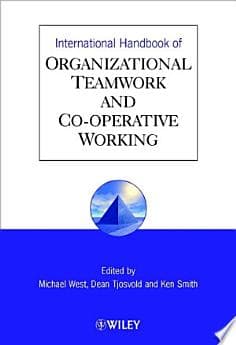- Published on
International Handbook of Organizational Teamwork and Cooperative Working
- Authors

- Name
- Michael A. West
- @search?q=Michael A. West

Teamwork Handbook Summary
This summary is derived from common themes and knowledge areas typically found in teamwork handbooks, aimed at enhancing team performance and collaboration within organizations.
Introduction
- Purpose of Teamwork: Emphasizes the significance of teamwork in achieving organizational goals, fostering innovation, and improving service delivery.
- Objective: To equip team members with the necessary skills and knowledge to work effectively in a team environment.
Chapter 1: Fundamentals of Teamwork
- Definition of a Team: A group of individuals working together towards a common goal.
- Characteristics of Effective Teams: Includes clear objectives, open communication, mutual respect, and diversity of skills.
Chapter 2: Building a Cohesive Team
- Recruitment: Selecting team members with complementary skills and a team-oriented attitude.
- Team Roles: Understanding and assigning roles based on individual strengths and weaknesses.
- Trust Building: Techniques for building trust among team members, crucial for team cohesion.
Chapter 3: Communication in Teams
- Effective Communication Techniques: Strategies for clear, open, and effective communication within teams.
- Handling Communication Barriers: Identifying and overcoming common obstacles to team communication.
Chapter 4: Conflict Resolution
- Identifying Sources of Conflict: Understanding common causes of team conflicts.
- Conflict Resolution Strategies: Methods for resolving conflicts constructively, without damaging team relationships.
Chapter 5: Motivation and Team Performance
- Motivating Team Members: Techniques for keeping the team motivated towards achieving its goals.
- Performance Evaluation: Methods for assessing team performance and providing constructive feedback.
Chapter 6: Adapting to Change
- Flexibility and Adaptability: The importance of being adaptable in a dynamic work environment.
- Managing Change: Strategies for effectively managing and adapting to change within teams.
Conclusion
- Continuous Improvement: Encourages ongoing development of team skills and processes.
- Building a Culture of Teamwork: Highlights the importance of fostering a culture that values collaboration, respect, and mutual support.
